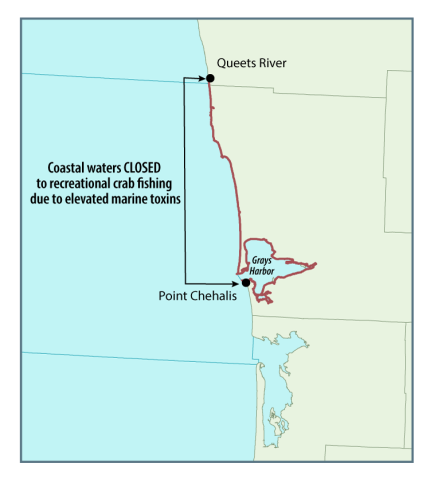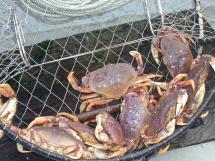ARCHIVED NEWS RELEASE
This document is provided for archival purposes only. Archived documents
do not reflect current WDFW regulations or policy and may contain factual
inaccuracies.
News release Nov. 24, 2020
Dan Ayres, 360-470-3557; Jason Wettstein 360-704-0258
OLYMPIA - Effective immediately, the recreational Dungeness crab fisheries on the Central Washington coast will close due to elevated marine toxin levels, state shellfish managers announced today.
The Washington Department of Fish and Wildlife (WDFW) closed crab fishing today (Nov. 24) in coastal waters stretching from the Queets River to Point Chehalis. This area includes Grays Harbor and the popular Westport Boat Basin.

WDFW announced the closure after testing showed domoic acid levels in crab exceeded standards for safe consumption established by the Washington State Department of Health (DOH). Domoic acid, a natural toxin produced by certain types of marine algae, can be harmful or even fatal if consumed in sufficient quantities. Cooking or freezing does not destroy domoic acid in shellfish.
The areas north of Queets River and south of Point Chehalis remain open to recreational crab fishing.
Levels of domoic acid have been increasing in coastal waters for several weeks, said Dan Ayres, WDFW coastal shellfish manager. Earlier this season, the department closed all Washington coastal beaches to razor clam digging due to high levels of the toxin.
“We’ve been closely watching toxin levels in shellfish,” Ayres said. “Domoic acid shows up more quickly in razor clams than in crabs.”
All sport crab gear must be removed from closed areas immediately or it will be subject to confiscation by Fish and Wildlife enforcement officers.
This is the first time since 2015 that a crab fishery has been closed in Washington due to domoic acid, Ayres said. The toxin was first detected on the Washington coast in 1991.
Regular testing of shellfish species found in the area - including oysters, hard-shell clams and mussels - shows those shellfish remain safe to eat. The exceptions are razor clams and Dungeness crabs.

The closure will continue until domoic acid levels return to safe levels for consumption.
Additional crab and razor clam samples will be collected after the Thanksgiving weekend from a variety of locations. Harvesters are advised to check the WDFW web page for any updates.
DOH will continue to test shellfish in all coastal marine waters. Harvesters can find up-to-date information on seasons and shellfish safety information on the Washington Shellfish Safety Map webpage. In addition, DOH recommends that crabbers who are fishing outside of the current closure area remove the crab viscera from their catch - to avoid any exposure to possible toxins.
More information about domoic acid can be found on WDFW's domoic acid webpage.